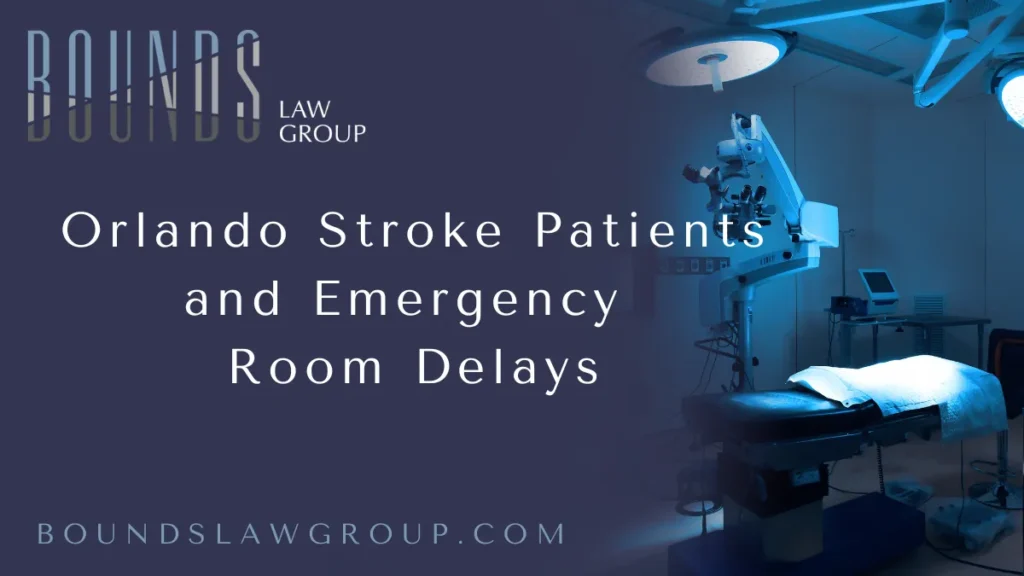
Bounds Law Group is deeply aware of the devastating consequences caused by stroke ER delays in Orlando. When every minute counts, delays in emergency stroke care can result in permanent disability, long-term impairment, or even death. Our experienced legal team is committed to helping victims and families affected by negligent hospital care, systemic failures, and unacceptable emergency room delays across Orlando and Central Florida.
Contact us today through our free case evaluation form or call 877-644-5122.
Stroke ER Delays Orlando: An Urgent Public Health Concern
A stroke represents a true medical emergency that requires immediate evaluation and treatment to prevent irreversible brain damage. When patients arrive at an emergency room with stroke symptoms, the accepted medical standard demands rapid triage, diagnostic imaging, and timely treatment including administration of medications like tPA or surgical interventions.
Unfortunately, many Orlando stroke victims experience delays at various points in emergency care. These stroke ER delays in Orlando are often caused by hospital understaffing, communication breakdowns, or failures to recognize and act upon urgent stroke symptoms. Such delays can lead to severe brain injury, lifelong disability, or wrongful death.
Common Causes of Stroke ER Delays in Orlando
Failure to Recognize Stroke Symptoms During Triage
Emergency room staff, particularly triage nurses, must be adept at quickly identifying classic stroke signs — including facial drooping, slurred speech, sudden weakness, or vision loss. Delays occur when these symptoms are overlooked or deprioritized, costing valuable time.
Delays in Critical Imaging Procedures
Performing a CT or MRI scan swiftly is essential to differentiate between ischemic and hemorrhagic strokes. Delays in scheduling or prioritizing imaging can postpone critical diagnosis and treatment decisions.
Slow Administration of tPA
For ischemic stroke patients, tPA administration within 3 to 4.5 hours of symptom onset is vital. Delays in ordering, evaluating, or obtaining consent for tPA significantly worsen patient outcomes.
Lack of Coordination Among Departments
Breakdowns in communication between the emergency room, neurology, and radiology teams often slow care delivery. Failure to consult neurologists promptly or relay test results can prolong treatment initiation dangerously.
Consequences of Stroke ER Delays in Orlando
Every minute a stroke patient waits, approximately 1.9 million neurons die, increasing the risk of permanent damage. The longer the delay, the greater the chances of:
- Paralysis or weakness on one side of the body (hemiplegia or hemiparesis)
- Speech and language impairments (aphasia)
- Cognitive decline and memory loss
- Loss of independence and quality of life
- Increased long-term care needs
- Death caused by untreated or undertreated stroke
These outcomes are often preventable with timely, appropriate emergency care.

The Role of Hospital Policies and Staffing in Stroke ER Delays Orlando
Systemic hospital issues, including policies and staffing shortages, play a crucial role in causing or preventing stroke ER delays in Orlando.
Impact of Staffing Shortages
Many emergency departments in Orlando face chronic understaffing in nursing, neurology, and radiology departments. Overburdened staff and insufficient specialist availability result in slower assessments, imaging, and treatment delivery.
Hospital Protocols and Stroke Code Activation
Effective stroke care depends on stroke code protocols that instantly mobilize multidisciplinary teams when a stroke is suspected. Hospitals lacking clear or enforced protocols, or failing to regularly train staff, experience higher delays and worse patient outcomes.
Technological and Systemic Solutions
Hospitals employing advanced triage software, tele-neurology consultations, and communication platforms reduce delays and improve care. Facilities that lag in technology adoption may unintentionally contribute to slower stroke interventions.
Accountability of Hospital Leadership
Hospital administrators must prioritize staffing, training, and process improvements to meet accepted standards. Failure to address systemic shortcomings can constitute institutional negligence.
Who Is Liable for Stroke ER Delays in Orlando?
Liability for stroke ER delays in Orlando may lie with:
- Emergency physicians
- Triage nurses and ER staff
- Radiology technicians and specialists
- Neurology consultants
- Hospital administrators responsible for policies and staffing
Our attorneys at Bounds Law Group meticulously investigate your case to identify all responsible parties and hold them accountable.
Pursuing a Medical Malpractice Claim for Stroke ER Delays
If you or a loved one has suffered due to delayed stroke care in an Orlando emergency room, you may be entitled to compensation covering:
- Past and future medical expenses
- Rehabilitation and therapy costs
- Lost wages and diminished earning capacity
- Pain, suffering, and emotional distress
- Loss of companionship or wrongful death damages
Our skilled legal team collaborates with medical experts to establish breaches in the standard of care and to quantify lifelong impacts.

Why Choose Bounds Law Group
At Bounds Law Group, we have a proven track record of success in Florida medical malpractice claims, including complex stroke delay cases. We combine deep medical knowledge with relentless advocacy to maximize compensation for our clients.
We provide:
- Thorough medical record analysis
- Expert consultation with neurologists and ER specialists
- Comprehensive liability investigations
- Dedicated representation against hospitals and insurers
- Compassionate client care throughout the process
Take Immediate Action to Protect Your Rights
Delays in filing malpractice claims can result in lost legal rights under Florida’s statute of limitations. If you or a family member was harmed by stroke ER delays in Orlando, act now.
Complete our free case evaluation form or call us today at 877-644-5122 for a confidential consultation. We work on a contingency fee basis—no fees unless we win.
Sources
- American Stroke Association – Time Lost Is Brain Lost
Offers critical information on stroke urgency and neuron death rates with delayed treatment.
https://www.stroke.org - National Institute of Neurological Disorders and Stroke – Stroke Emergency Response
Provides authoritative guidance on stroke symptoms and emergency care standards.
https://www.ninds.nih.gov - Agency for Healthcare Research and Quality – Emergency Department Patient Flow
Explores how emergency department inefficiencies impact patient outcomes, including stroke care delays.
https://www.ahrq.gov

